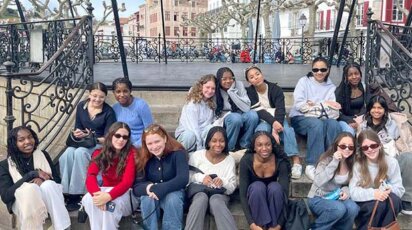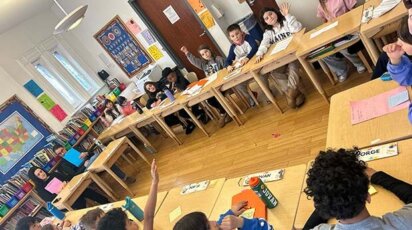News
New technology dovetailed with poetry in an innovative project. Students in John Rearick’s AP English Literature class used the video discussion platform Flipgrid to record videos about poems that spoke to them. “It was a great wedding of old school poetry analysis, remote learning, and high-tech teaching tools,” said Rearick. Students looked through their poetry anthology for a poem. “Then, they used the literary tools and language we’ve been using to write a script for the media—audio or visual… The aim was to create an assignment that made the students’ great work available to a wider audience.”
Nina Ryan ’21 chose Sylvia Plath’s “Mirror.” “I chose this because Sylvia Plath is a personal favorite of mine and I was intrigued by her exploration of the limitations of womanhood in this particular poem. I really enjoyed learning more about Sylvia Plath’s life when I was making this podcast. I found some of Plath’s journal entries from when she was a teenager and I feel like I was better able to understand who she was as both a poet and a person, and this aided me in analyzing her work. I hope the listener will understand the importance of knowing at least a little bit about the writer’s life in the process of understanding the message of their work.”
Ted Hughes’ poem “Hawk Roosting” is the subject of Melanie Macleod’s ’21 podcast. She explained, “It is told from the perspective of a hawk who is reflecting on his daily routine and the world at large. I chose this because I enjoyed the imagery and the animal perspective, which is very unusual in poetry, but is typical of Hughes’ style.”
“I really enjoyed making a podcast,” Macleod said, “because I was able to gather my ideas and create a more in-depth understanding of the poem. It was challenging to film myself, but in doing so I was able to make a clearer argument and create a more interesting narrative for listeners. I hope that listeners were engaged with the piece and enjoyed my analysis of Hughes’ work. I also hope that they were able to grasp a better identity of Hughes as a writer and a poet. I spoke in-depth about some of the visual symbols that stuck with me and I hope in listening to my analysis readers were able to make their own findings.”
Izzy Axinn ’21 chose “There’s a Certain Slant of Light” by Emily Dickinson. “I like talking with my dad about the poems we are reading and Dickinson is one of his favorites,” said Axinn. “I enjoyed sharing this poem. I hope the listener will be able to reflect on some of the themes of the poem and their implications in our present times.”
Taejun Kim-Grant ’21 said, “I picked Langston Hughes’ ‘The Weary Blues’ because I really enjoy Harlem Renaissance poetry. I wanted to choose Langston Hughes because he really exemplifies that period. I enjoyed getting to analyze the poem because it went really well. I liked the poetry podcast because it was a new way of looking at the poems. I hope the listener has a greater understanding of Langston Hughes and the meaning of his poem.”



